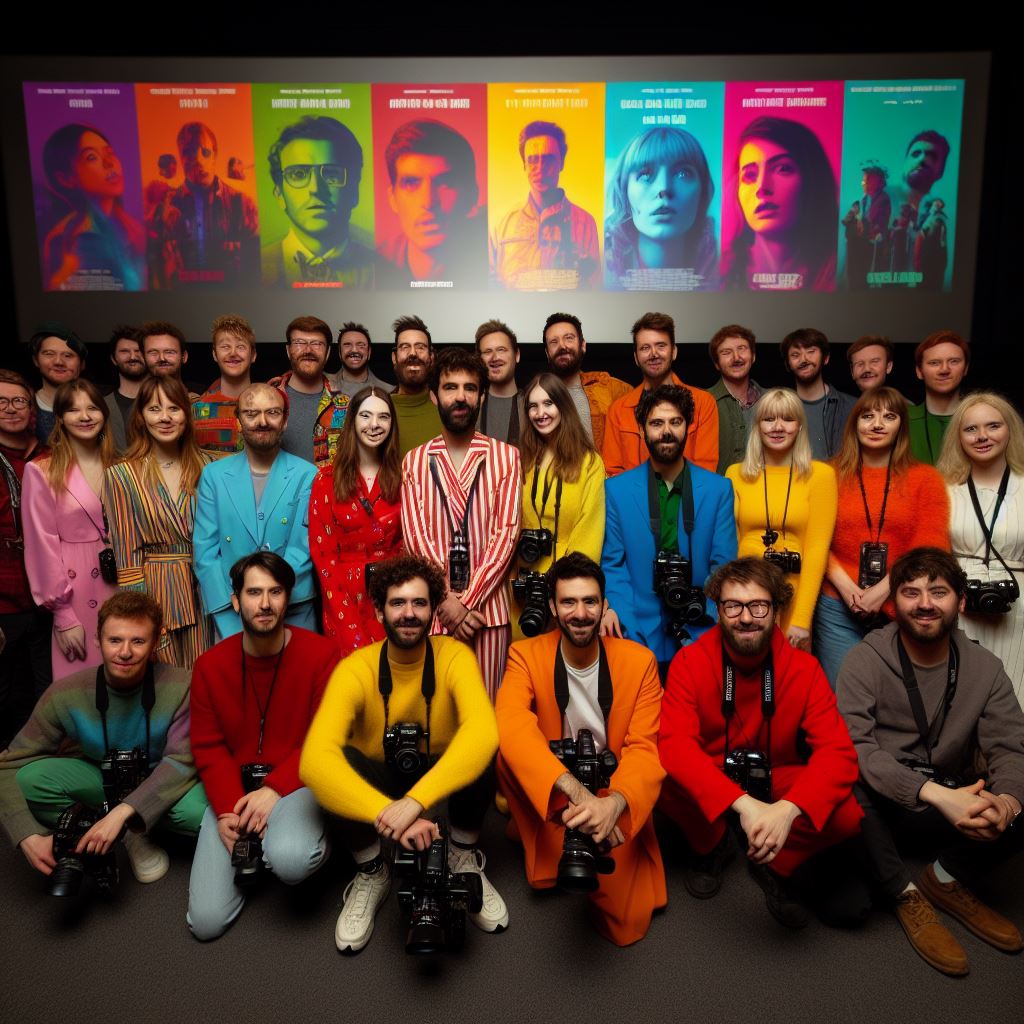Introduction
The UK’s entertainment industry is thriving, offering various professions and careers.
In this section, we will explore UK producers in theatre, film, and TV.
In the dynamic realm of UK entertainment production, a captivating dichotomy unfolds—Theatre versus Film and TV.
Producers navigate this creative tug-of-war, juggling the immediacy and intimacy of live performances with the boundless possibilities of cinematic storytelling.
The stage beckons with raw emotions, immediate audience feedback, and the allure of a shared moment.
On the flip side, the allure of celluloid and digital screens promises a vast canvas for storytelling, reaching global audiences.
This section delves into the distinct challenges and triumphs faced by UK producers, juxtaposing the demands of these two divergent yet entwined worlds.
From script to stage and screen, each venture presents its unique set of hurdles, requiring adaptability, strategic foresight, and an unwavering commitment to captivating audiences in the ever-evolving landscape of British entertainment production.
Read: UK Music Scene: How to Get Noticed
Difference in Production Process
The Collaborative Nature of Theatre Production
Theatre production is a highly collaborative process that involves various individuals working together towards a common goal.
Collaboration is crucial in theatre, as directors, actors, designers, and technicians must all work in harmony.
Each person’s contributions are essential in creating a successful live performance.
The Importance of Live Performances and Audience Interaction
One of the distinct aspects of theatre production is the live performance aspect.
Unlike film and TV, theatre relies on the immediate reaction and interaction with the audience.
The energy and response from the audience greatly contribute to the overall experience of the performance.
The Complexities of Coordinating Rehearsals, Set Designs, and Technical Elements in Theatre
Theatre production involves intricate coordination of rehearsals, set designs, and technical aspects.
Rehearsals require synchronization between actors and the creative team to ensure a seamless performance.
Set designs must be carefully crafted to enhance the story being told, while technical elements such as lighting and sound play a crucial role.
The Fast-paced and Demanding Nature of Theatre Production
Theatre production is known for its fast pace and demanding nature.
Due to the live nature of the performances, there is little room for mistakes or delays.
Everyone involved must be able to adapt quickly and work efficiently under pressure.
The More Controlled and Structured Environment of Film and TV Production
In contrast to theatre production, film and TV production offer a more controlled and structured environment.
The use of cameras allows for multiple takes and different angles, providing greater flexibility during filming.
This enables filmmakers to refine and perfect scenes before moving on to the next.
The Use of Cameras, Post-production Editing, and Visual Effects
Film and TV production involve the use of cameras, post-production editing, and visual effects.
Cameras capture the performances and allow for various cinematographic techniques to enhance the storytelling.
Post-production editing enables filmmakers to manipulate the footage and add visual effects to create a desired impact.
Personalized UK Career Consulting
Receive tailored career guidance designed just for you. Get actionable steps and expert support to boost your career in 1-3 days. Take control of your career now.
Get StartedThe Role of Location Scouting, Script Development, and Casting in Film and TV Production
Film and TV production require extensive location scouting to find suitable settings for the story being told.
Script development involves refining and perfecting the narrative through multiple drafts.
Casting plays a crucial role in finding the right actors to bring the characters to life and convey the story effectively.
The Longer Timeframes and Larger Budgets Often Associated with Film and TV Projects
Film and TV projects often have longer timeframes and larger budgets compared to theatre productions.
The meticulous planning and execution involved in filmmaking demand a substantial amount of time and resources.
The larger budgets allow for significant production values, elaborate sets, and high-quality special effects.
In short, theatre production differs from film and TV production in various ways.
Theatre emphasizes the collaborative nature of creating live performances and relies on the immediate reaction and interaction with the audience.
It involves complex coordination of rehearsals, set designs, and technical elements.
On the other hand, film and TV production offer a more controlled and structured environment, with the use of cameras, post-production editing, and visual effects.
It involves extensive location scouting, script development, and casting.
Additionally, film and TV projects often have longer timeframes and larger budgets.
Despite their differences, both theatre and film/TV production are intricately crafted art forms that require immense dedication and skill.
Read: UK Music Festivals: A Musician’s Role
Skills and Expertise for Producers in Theatre and Film/TV
Producers play a vital role in the success of both theatre productions and film/TV projects.
These professionals possess a wide range of skills and expertise that are essential to their respective industries.
Theatre Producers
In theatre production, specific skills are necessary to ensure a seamless and captivating experience for the audience. These skills include:
- Creativity and Imagination: Theatre producers need to have a strong sense of creativity and imagination to shape the overall vision of the production.
- Adaptability and Problem-Solving: During live performances, unexpected issues may arise.
Producers must be able to think on their feet and find solutions in real-time. - Attention to Detail: Every aspect of a theatre production needs to be carefully managed.
Producers must pay attention to detail to ensure that everything runs smoothly. - Effective Communication: Producers must possess excellent communication skills to effectively convey their vision to the cast, crew, and other stakeholders.
- Collaboration: Theatre productions involve a large team of individuals working together.
Producers need to foster collaboration and maintain positive relationships with all involved
Film/TV Producers
Producers in the film and TV industry also require a unique set of skills to bring their projects to life.
These skills include:
- Managing Budgets: Film/TV producers need to have a strong understanding of financial management to ensure that the project stays within budget.
- Negotiating Contracts: Producers must have the ability to negotiate contracts with various stakeholders, including actors, crew members, and suppliers.
- Securing Funding: Funding is crucial for film and TV projects.
Producers need to be adept at securing financial support from investors, studios, or other sources. - Attention to Detail: Similar to theatre, producers in film and TV must pay close attention to detail to ensure that every element of the production is executed precisely.
- Networking and Relationship Building: Producers need to develop a network of contacts within the industry to maximize opportunities for collaboration and funding.
- Effective Communication: Clear and efficient communication is vital in film/TV production, especially when leading a large crew of individuals with various roles
In esssence, both theatre and film/TV producers possess distinct skills and expertise that contribute to the success of their respective projects.
Theatre producers rely on creativity, adaptability, and attention to detail, while film/TV producers focus on managing budgets, securing funding, and effective communication.
Regardless of the medium, these professionals play a crucial role in bringing artistic visions to life.
Read: Music Education: Is It Vital in the UK?

Career Opportunities
When it comes to theatre production, there are various career paths that individuals can pursue.
One of these paths is becoming an executive producer.
Executive producers are responsible for overseeing the entire production process.
Another important role is that of a line producer.
Line producers handle the logistics and budgeting of the production, making sure everything stays on track.
Your Dream Job Starts with a Perfect CV
Get a tailored CV and cover letter that captures your unique strengths and stands out in your industry. Let us help you make an unforgettable first impression.
Get StartedAssociate producers also play a significant role in theatre production.
They assist the executive and line producers in various tasks, aiding in the smooth running of the production.
Theatre production also offers opportunities to produce plays, musicals, and other theatrical performances.
Producing a play involves selecting the script, hiring the creative team, and managing the production from rehearsals to opening night.
Musical production requires additional skills, such as coordinating with composers, choreographers, and musical directors.
Furthermore, producing other theatrical performances, such as dance shows or immersive experiences, allows for creativity and innovation within the field.
Moving on to film and TV production, this industry also offers an array of career opportunities.
Producers play a crucial role in bringing scripts to life on the big screen or TV.
They are involved in all aspects of production, from script development to post-production.
Producers collaborate with directors, writers, and actors to ensure the vision of the project is realized.
In film production, there is potential for producing feature films.
This includes selecting scripts, securing financing, hiring a cast and crew, and overseeing the production process.
Documentary production is another avenue within film and TV, offering the opportunity to create thought-provoking and impactful content.
Producing TV series involves managing multiple episodes, coordinating with writers, directors, and actors, and ensuring the continuity of the show’s narrative.
Both theatre and film/TV production offer exciting career opportunities.
Theatre production allows individuals to produce plays, musicals, and other theatrical performances, showcasing their creativity and organizational skills.
Meanwhile, film and TV production allows for the creation of captivating visual stories, providing opportunities to work with talented individuals across various disciplines.
Optimize Your LinkedIn for Success
Boost your LinkedIn profile with a professional bio, keyword-rich headline, and strategic recommendations that attract recruiters. Stand out from the crowd and get noticed.
Optimize NowWhether it’s the allure of the stage or the silver screen, the world of production offers a fulfilling and dynamic career choice for aspiring producers.
Read: Breaking into Classical Music in the UK
Conclusion
The production processes of theatre and film/TV differ significantly.
Theatre requires live performances, while film/TV involves capturing and editing visuals.
Producers in each medium must possess unique skills and expertise to succeed.
Theatre producers must excel in fundraising and managing live performances, while film/TV producers need strong networking and negotiation skills.
Both industries offer diverse career opportunities, such as producing, directing, and production coordination.
Aspiring producers should explore their interests and seize opportunities within the industry.
Whether it is working in the magic of theatre or the glamour of film/TV, a rewarding career awaits for those passionate about bringing stories to life.




